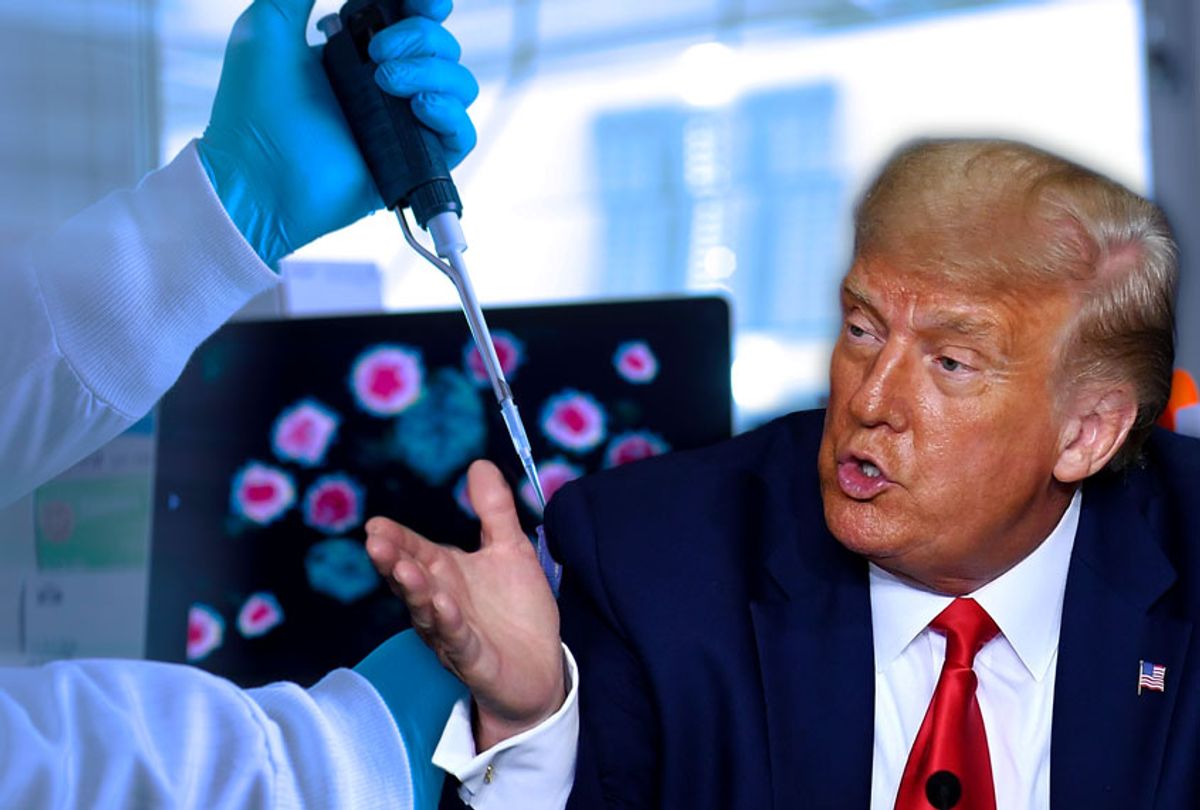Taking the advice of profit-driven pharmaceutical corporations over that of his own public health agencies and experts, President Donald Trump is blocking the Food and Drug Administration from imposing tougher safety requirements on the authorization of a coronavirus vaccine after drug company executives privately voiced disapproval with the push for stricter federal standards.
Politico reported late Monday that the White House's "decision to halt release of new standards for emergency authorization of a Covid-19 vaccine came after officials close to [Trump] told the FDA that the pharmaceutical industry had objected to the tougher requirements."
"The White House cited the private-sector opposition as a chief reason for blocking the guidelines, which aim to hold companies' vaccines to a higher bar for safety and effectiveness and would likely push any authorization beyond Election Day," according to Politico. "The fact that the president was siding with drug makers over his own regulators in shelving the guidance... adds a new dimension to concerns about White House interference in the FDA."
Trump's stonewalling of more stringent federal standards comes amid widespread concerns that the president's politically motivated push for approval of a coronavirus vaccine before November 3 could result in a product that is insufficiently tested and unsafe. Late Monday, shortly after his release from Walter Reed National Military Medical Center, the president declared that "vaccines are coming momentarily"—a timeline scientists have rejected.
During the presidential debate last week with Democratic nominee Joe Biden, Trump dismissed more cautious vaccine timelines suggested by experts in his own administration as "very political" and said pharmaceutical executives have personally told him that "they can go faster than that by a lot."
"I've spoken to Pfizer, I've spoken to all of the people that you have to speak to, Moderna, Johnson & Johnson, and others," the president said.
When Biden said he trusts scientists over Trump, the president responded, "You don't trust Johnson & Johnson, Pfizer?"
As Common Dreams reported last month, the CEO of pharma giant Eli Lilly insisted that the drug industry can police itself as it works to develop an effective coronavirus vaccine—a claim watchdog group Accountable.US dismissed as "like the wolf saying he'll guard the henhouse."
"This is an absolutely egregious breach of public trust and clear politicization of what should be a vaccine approval process based on science and public health," Eli Zupnick, spokesperson for Accountable Pharma, said in a statement Tuesday. "The timeline for vaccine approval should be dictated by what's in the best interests of patients and the country, not what is best for President Trump's political future."
"The White House must retract this interference with the scientists and public health experts at the FDA," Zupnick added, "and must stop undermining the already eroded public trust in their vaccine approval process."
As the New York Times reported Monday, "a main sticking point" for the Trump White House has been the FDA's "recommendation that volunteers who have participated in vaccine clinical trials be followed for a median of two months after the final dose before any authorization is granted."
"Given where the clinical trials stand, that two-month follow-up period would all but preclude any emergency clearance before Election Day," noted the Times, which reported that White House Chief of Staff Mark Meadows—a former Republican congressman with no public health or scientific expertise—has been leading the charge against the stricter FDA standards.
"This administration is a menace to public health," tweeted Jonathan Reiner, professor of medicine and surgery at the George Washington University School of Medicine and Health Sciences.
Joseph Sakran, a public health expert and trauma surgeon at Johns Hopkins Medicine, said the Trump White House's blocking of tougher vaccine safety guidelines is further "political manipulation of science—this is exactly what so many of us were worried about."



Shares